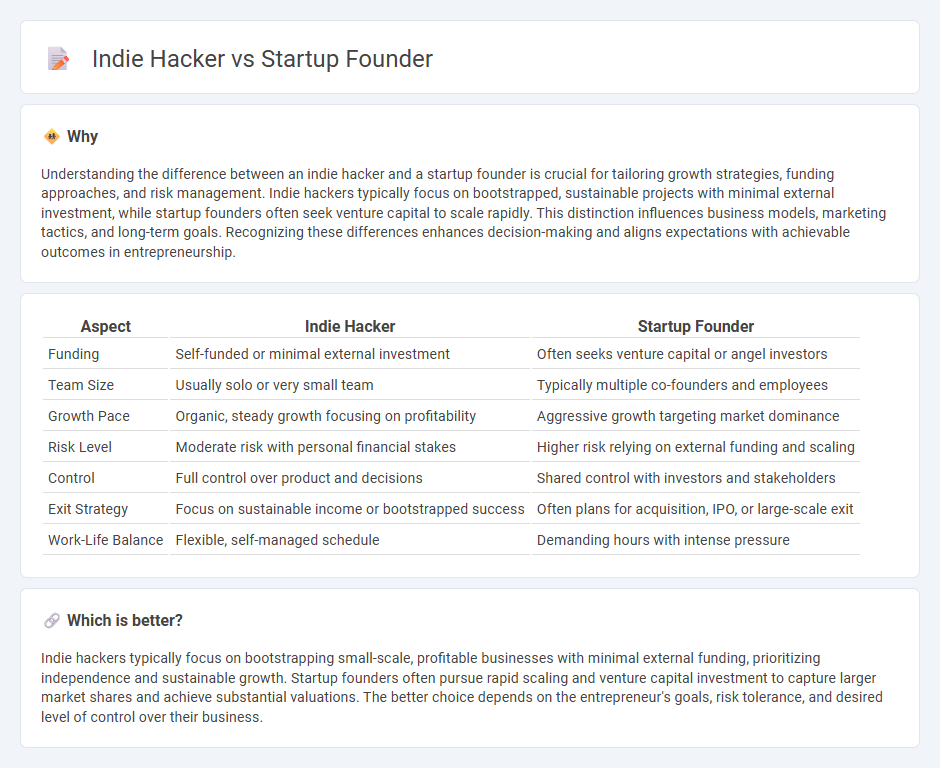
Indie hackers build businesses independently, focusing on sustainable growth with minimal resources and direct customer feedback, often leveraging online tools and platforms. Startup founders, by contrast, seek rapid scaling and venture capital investment to accelerate growth and capture larger market shares. Explore deeper insights to understand which entrepreneurial path suits your ambitions best.
Why it is important
Understanding the difference between an indie hacker and a startup founder is crucial for tailoring growth strategies, funding approaches, and risk management. Indie hackers typically focus on bootstrapped, sustainable projects with minimal external investment, while startup founders often seek venture capital to scale rapidly. This distinction influences business models, marketing tactics, and long-term goals. Recognizing these differences enhances decision-making and aligns expectations with achievable outcomes in entrepreneurship.
Comparison Table
| Aspect | Indie Hacker | Startup Founder |
|---|---|---|
| Funding | Self-funded or minimal external investment | Often seeks venture capital or angel investors |
| Team Size | Usually solo or very small team | Typically multiple co-founders and employees |
| Growth Pace | Organic, steady growth focusing on profitability | Aggressive growth targeting market dominance |
| Risk Level | Moderate risk with personal financial stakes | Higher risk relying on external funding and scaling |
| Control | Full control over product and decisions | Shared control with investors and stakeholders |
| Exit Strategy | Focus on sustainable income or bootstrapped success | Often plans for acquisition, IPO, or large-scale exit |
| Work-Life Balance | Flexible, self-managed schedule | Demanding hours with intense pressure |
Which is better?
Indie hackers typically focus on bootstrapping small-scale, profitable businesses with minimal external funding, prioritizing independence and sustainable growth. Startup founders often pursue rapid scaling and venture capital investment to capture larger market shares and achieve substantial valuations. The better choice depends on the entrepreneur's goals, risk tolerance, and desired level of control over their business.
Connection
Indie hackers and startup founders both drive innovation through self-driven ventures, focusing on building scalable businesses with limited initial resources. They leverage digital tools and lean methodologies to test ideas rapidly, often prioritizing customer feedback and sustainable growth. Their shared emphasis on autonomy and problem-solving creates a dynamic ecosystem that fuels entrepreneurial success.
Key Terms
**Startup Founder:**
Startup founders are entrepreneurs who launch scalable businesses with the goal of securing external funding, building a team, and rapidly growing their company to capture significant market share. They prioritize strategic planning, product development, and investor relations to achieve substantial business milestones. Discover key strategies and insights to excel as a startup founder.
Venture Capital
Startup founders often prioritize securing venture capital to fuel rapid growth and scale their businesses through aggressive market expansion. Indie hackers typically rely on bootstrapping, focusing on sustainable revenue and organic growth without external funding. Explore the distinct funding strategies and growth models to determine the best path for your entrepreneurial goals.
Scalability
Startup founders prioritize scalability by building businesses designed for rapid growth and significant market impact, often seeking external funding and large customer bases. Indie hackers focus on sustainable, smaller-scale projects with organic growth, emphasizing profitability and independence over aggressive expansion. Explore the differences in scalability strategies to determine which approach aligns best with your entrepreneurial goals.
Source and External Links
Startup Founders & Entrepreneurs: What's the Difference? - A startup founder is the person who originates the idea to improve a product or fill a market need and takes the initial steps to build a company around that idea, often working tirelessly to grow the startup into a successful business.
The First-Time Founder's Guide to Learning Everything the Hard Way - First-time startup founders often face steep learning curves, dealing with challenges like financial constraints, lack of connections, and management hurdles, requiring resilience and grit to build a sustainable company.
Everything You Need to Know About Startup Founders and Cofounders - A startup founder creates a new business based on an idea and may do so alone or with cofounders, who share credit and bring complementary skills essential to the startup's early success.
 dowidth.com
dowidth.com